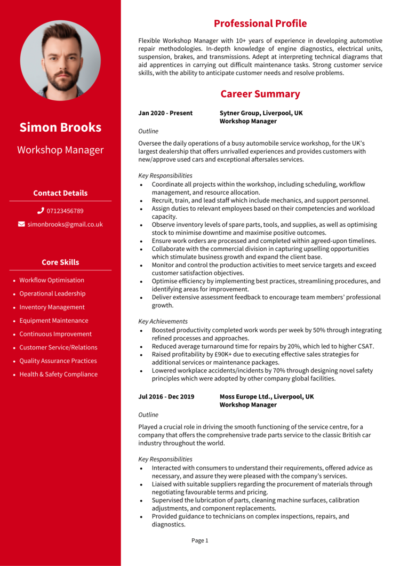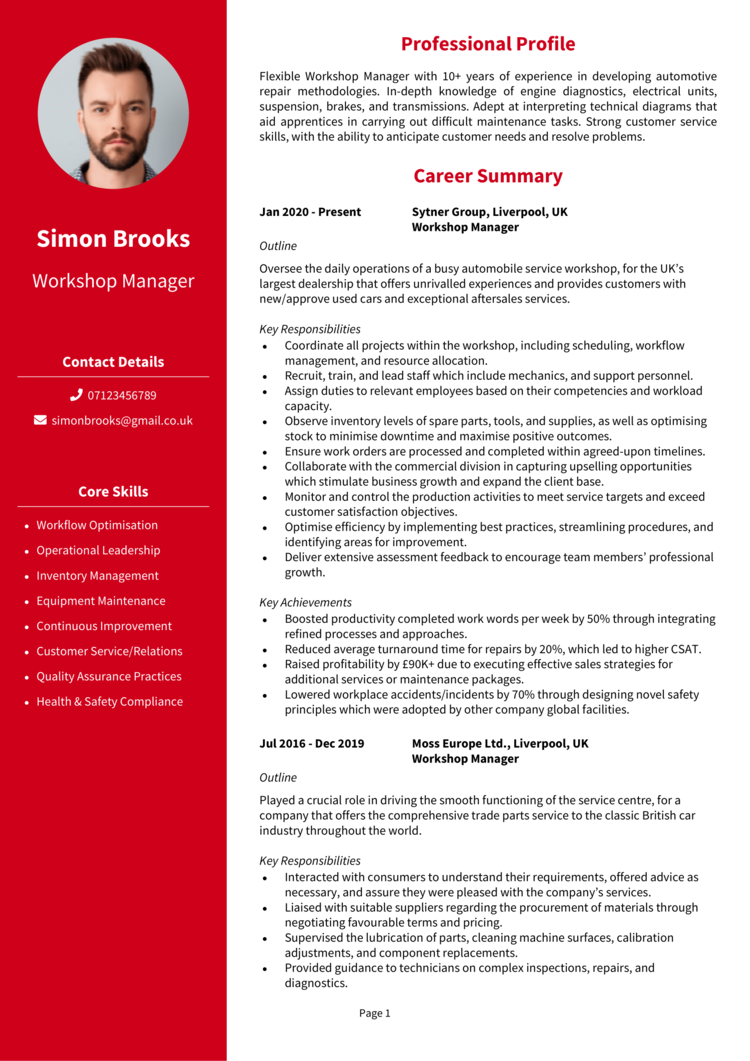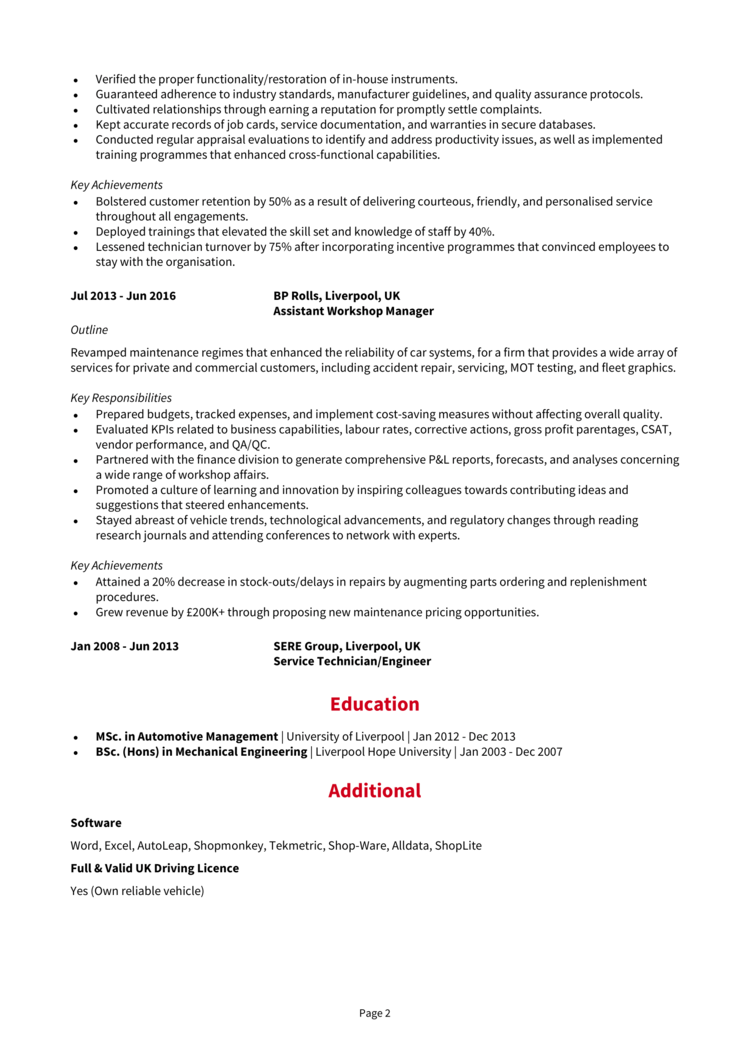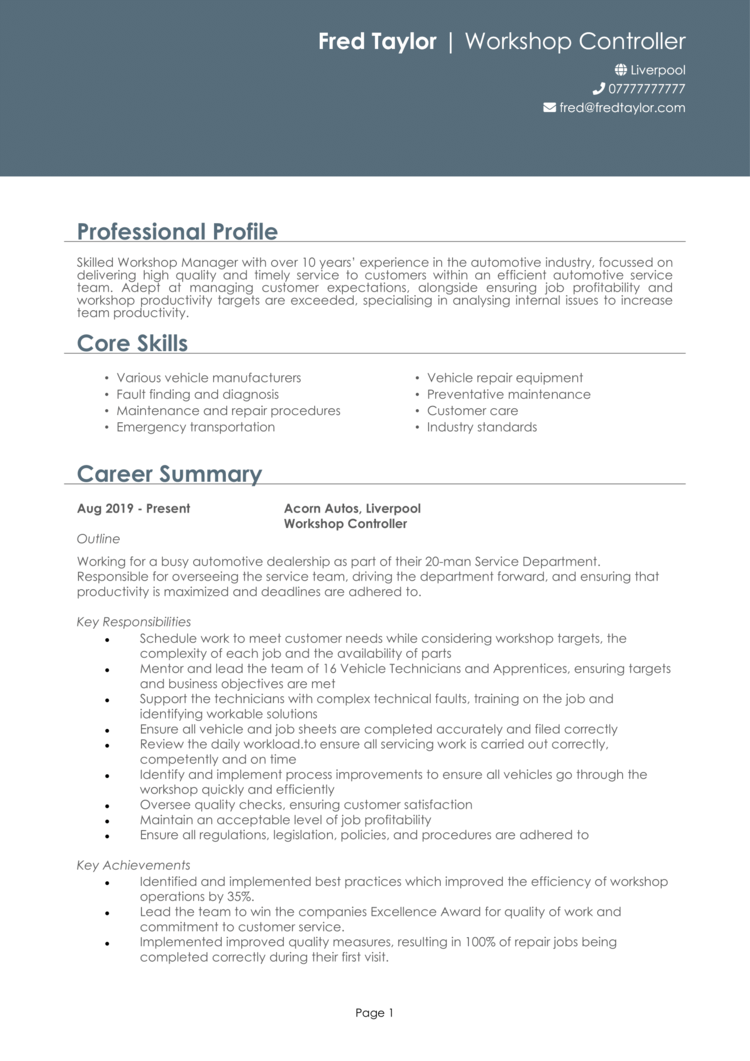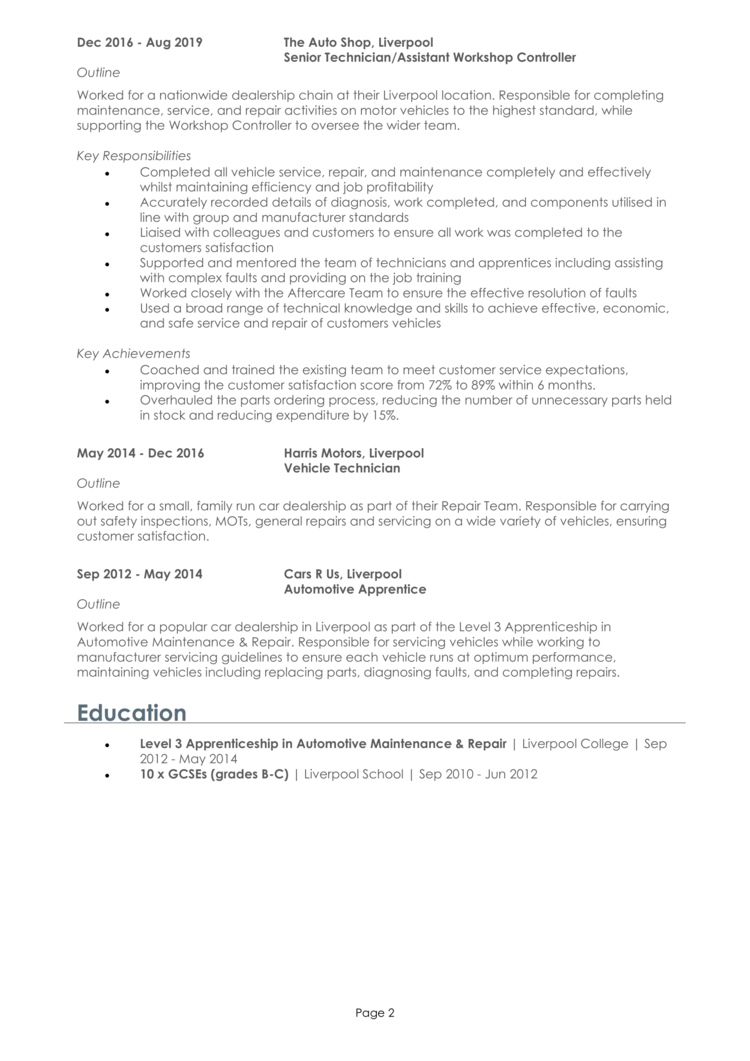Do you have what it takes to oversee the entire workshop, assign tasks, manage supplies and offer advice on important projects?
Then you’re perfect for the role of workshop manager or controller, you just need to prove that to the recruiter first.
In the guide below, we’ll provide you with all the tools you need to write a strong application, including 2 workshop manager CV examples and a bucketload of top tips.
|
Workshop Manager CV example
Workshop Controller CV example
This is a good example of a Workshop Manager CV which is professionally formatted, and structured in a way that allows recruiters to easily find and understand the candidate’s key selling points.
Take some time to look at this CV and refer to it throughout the writing of your own CV for best results.


Workshop Manager CV format and structure
The format and structure of your CV is important because it will determine how easy it is for recruiters and employers to read your CV.
If they can find the information they need quickly, they’ll be happy; but if they struggle, your application could be overlooked.
A simple and logical structure will always create a better reading experience than a complex structure, and with a few simple formatting tricks, you’ll be good to go.
Tips for formatting your Workshop Manager CV
- Length: Even if you’ve got tons of experience to brag about, recruiters don’t have time to read through overly lengthy CVs. Keep it short, concise and relevant – a CV length of 2 sides of A4 pages or less is perfect for the attention spans in today’s job market.
- Readability: Recruiters appreciate CVs that they can quickly scan through without trouble. Ensure yours makes the cut by formatting your headings for attention (bold or coloured fonts should do the trick) and breaking up long paragraphs into smaller chunks or short, snappy bullet points.
- Design & format: Your CV needs to look professional, sleek and easy to read. A subtle colour palette, clear font and simple design are generally best for this, as fancy designs are often harder to navigate.
- Photos: Profile photos or aren’t a requirement for most industries, so you don’t need to add one in the UK – but if you do, just make sure it looks professional
Quick tip: Creating a professional CV style can be difficult and time-consuming when using Microsoft Word or Google Docs. To create a winning CV quickly, try our quick-and-easy CV Builder and use one of their eye-catching professional CV templates.
CV structure
As you write your CV, divide and sub-head into the following sections:
- Name and contact details – Always start with these, so employers know exactly how to get in touch with you.
- CV profile – Add a short summary of your relevant experience, skills and achievements, which highlights your suitability.
- Core skills section – A 2-3 columned list of your key skills.
- Work experience – A detailed list of any relevant work experience, whether paid or voluntary.
- Education – An overview of your academic background and any training you may have completed.
- Hobbies and interests – A brief overview of your hobbies and interests, if they’re relevant (optional).
Now you understand the basic layout of a CV, here’s what you should include in each section of yours.
Contact Details
Make it easy for recruiters to get in touch, by heading your CV with your contact details.
There’s no need for excessive details – just list the basics:
- Mobile number
- Email address – Use a professional address with no nicknames.
- Location – Just write your general location, such as ‘London’ or ‘Cardiff’ – there’s no need to put your full address.
- LinkedIn profile or portfolio URL
Workshop Manager CV Profile
Your CV profile is basically a short introductory paragraph, which summarises your key selling points and highlights why you’d make a good hire.
So, write a well-rounded summary of what you do, what your key skills are, and what relevant experience you have.
It needs to be short, snappy and punchy and, ultimately, entice the reader to read the rest of your CV.
How to write a good CV profile:
- Make it short and sharp: The best CV profiles are short, sharp and highly relevant to the target role. For this reason, it’s best to write 3-4 lines of high-level information, as anything over might be missed.
- Tailor it: Before writing your CV, make sure to do some research. Figure out exactly what your desired employers are looking for and make sure that you are making those requirements prominent in your CV profile, and throughout.
- Don’t add an objective: Leave your career objectives or goals out of your profile. You only have limited space to work with, so they’re best suited to your cover letter.
- Avoid generic phrases: Clichés like “blue-sky thinker with a go-getter attitude” might sound impressive to you, but they don’t actually tell the recruiter much about you. Concentrate on highlighting hard facts and skills, as recruiters are more likely to take these on board.
Example CV profile for Workshop Manager
What to include in your Workshop Manager CV profile?
- Experience overview: Recruiters will want to know what type of companies you’ve worked for, industries you have knowledge of, and the type of work you’ve carried out in the past, so give them a summary of this in your profile.
- Targeted skills: Make your most relevant Workshop Manager key skills clear in your profile. These should be tailored to the specific role you’re applying for – so make sure to check the job description first, and aim to match their requirements as closely as you can.
- Important qualifications: If the jobs you are applying to require candidates to have certain qualifications, then you must add them in your profile to ensure they are seen by hiring managers.
Quick tip: If you are finding it difficult to write an attention-grabbing CV profile, choose from hundreds of pre-written profiles across all industries, and add one to your CV with one click in our quick-and-easy CV Builder. All profiles are written by recruitment experts and easily tailored to suit your unique skillset.
Core skills section
To ensure that your most relevant skills catch the eye of readers, create a core skills section below your profile.
This section should be presented in 2-3 columns of bullet points highlighting your applicable skills. Before crafting this section, carefully examine the job description and create a list of any required skills, specialisms, or knowledge.
Use this list to include the necessary information in your section and present yourself as the ideal match for the position.
Important skills for your Workshop Manager CV
Workshop Management – Managing all aspects of workshop operations, including scheduling, resource allocation, and workflow coordination, to ensure efficient and productive operations.
Technical Expertise – Utilising strong knowledge and hands-on experience in the specific field of the workshop, whether it’s automotive, woodworking, metal fabrication, or any other industry, to oversee and guide the technical processes.
Equipment and Tool Management – Utilising knowledge of workshop tools, machinery, and equipment to ensure optimal performance and adherence to health and safety regulations.
Quality Control – Implementing and maintaining quality control procedures and standards to ensure that products or services produced in the workshop meet or exceed customer expectations and industry requirements.
Inventory Management – Managing workshop inventory, including stock tracking, ordering, and maintaining appropriate stock levels to support smooth operations and minimise downtime.
Team Leadership – Managing and motivating workshop staff, delegating tasks, providing guidance, and resolving conflicts to promote a positive and productive work environment.
Health and Safety Compliance – Maintaining an in-depth knowledge of health and safety regulations and best practices, ensuring full compliance within the workshop, and implementing safety measures to minimise risks and maintain a safe working environment.
Problem Resolution and Troubleshooting – Identifying and resolving technical issues, troubleshooting equipment malfunctions, and overcoming challenges that may arise during workshop operations.
Project Management – Utilising project management methodologies and techniques to effectively plan, execute, and monitor workshop projects, ensuring timely delivery, resource optimisation, and customer satisfaction.
Stakeholder Communication and Collaboration – Effectively interacting with workshop staff, clients, suppliers, and other stakeholders, fostering strong working relationships, and facilitating effective collaboration.
Quick tip: Our quick-and-easy CV Builder has thousands of in-demand skills for all industries and professions, that can be added to your CV in seconds – This will save you time and ensure you get noticed by recruiters.


Work experience
Recruiters will be itching to know more about your relevant experience by now.
Kick-start this section with your most recent (or current) position, and work your way backwards through your history.
You can include voluntary and freelance work, too – as long as you’re honest about the nature of the work.
Structuring each job
If you don’t pay attention to the structure of your career history section, it could quickly become bulky and overwhelming.
Get in recruiters’ good books by creating a pleasant reading experience, using the 3-step structure below:
Outline
Provide a brief overview of the job as a whole, such as what the overriding purpose of your job was and what type of company you worked for.
Key responsibilities
Follow with a snappy list of bullet points, detailing your daily duties and responsibilities.
Tailor it to the role you’re applying for by mentioning how you put the target employer’s desired hard skills and knowledge to use in this role.
Key achievements
Finish off by showcasing 1-3 key achievements made within the role.
This could be anything that had a positive effect on your company, clients or customers, such as saving time or money, receiving exemplary feedback or receiving an award.
Sample job description for Workshop Manager CV
Outline
Oversee the daily operations of a busy automobile service workshop, for the UK’s largest dealership that offers unrivalled experiences and provides customers with new/approve used cars and exceptional aftersales services.
Key Responsibilities
- Coordinate all projects within the workshop, including scheduling, workflow management, and resource allocation.
- Recruit, train, and lead staff which include mechanics, and support personnel.
- Assign duties to relevant employees based on their competencies and workload capacity.
- Observe inventory levels of spare parts, tools, and supplies, as well as optimising stock to minimise downtime and maximise positive outcomes.
Quick tip: Create impressive job descriptions easily in our quick-and-easy CV Builder by adding pre-written job phrases for every industry and career stage.
Education section
After your work experience, your education section should provide a detailed view of your academic background.
Begin with those most relevant to Workshop Manager jobs, such as vocational training or degrees.
If you have space, you can also mention your academic qualifications, such as A-Levels and GCSEs.
Focus on the qualifications that are most relevant to the jobs you are applying for.
Hobbies and interests
This section is entirely optional, so you’ll have to use your own judgement to figure out if it’s worth including.
If your hobbies and interests could make you appear more suitable for your dream job, then they are definitely worth adding.
Interests which are related to the industry, or hobbies like sports teams or volunteering, which display valuable transferable skills might be worth including.


A strong, compelling CV is essential to get noticed and land interviews with the best employers.
To ensure your CV stands out from the competition, make sure to tailor it to your target role and pack it with sector-specific skills and results.
Remember to triple-check for spelling and grammar errors before hitting send.
Good luck with the job search!


